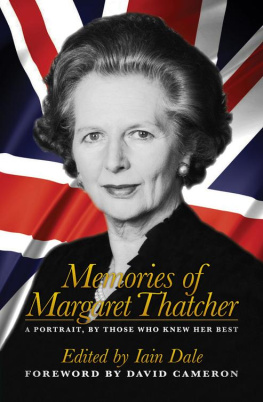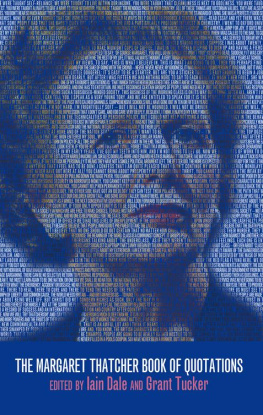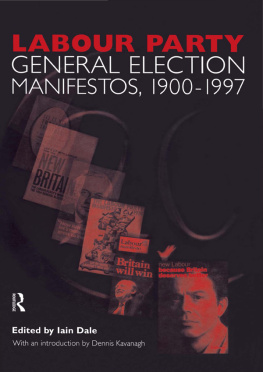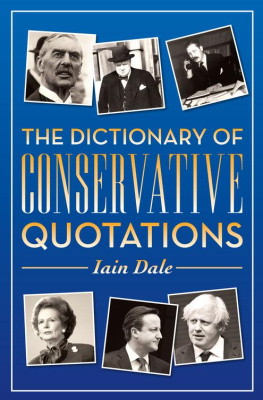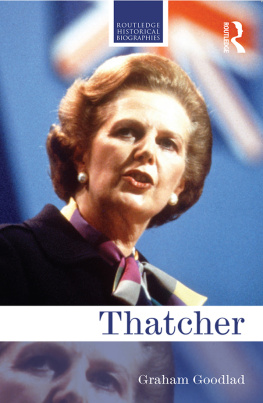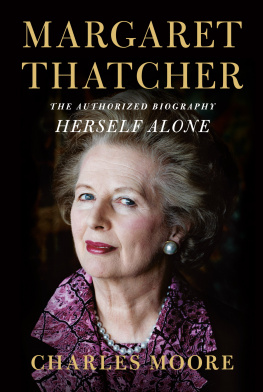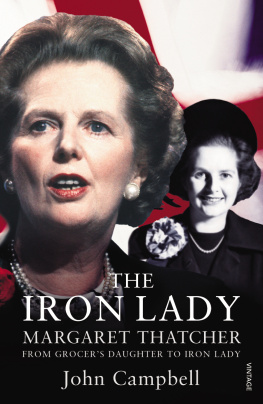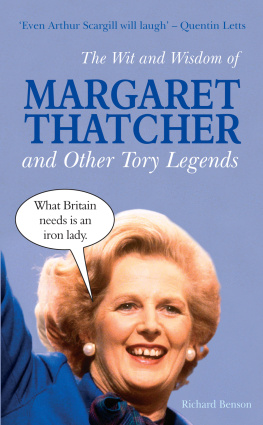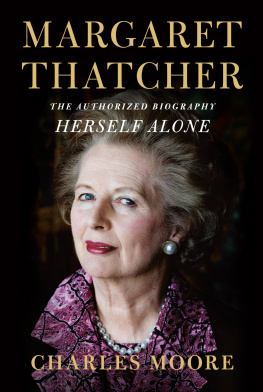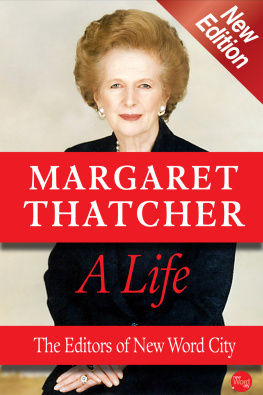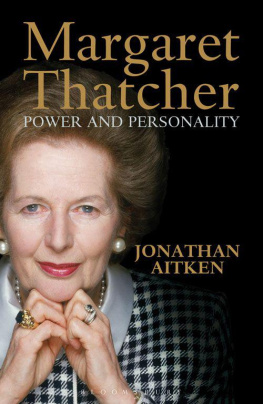T he idea for this book came on a holiday to the United States when I came across a marvellous book called Recollections of Reagan: A Portrait of Ronald Reagan (edited by Peter Hannaford and published by Morrow in 1997). Using the premise that if it was good enough for Ronald Reagan it was good enough for Margaret Thatcher, I stored the idea at the back of my mind and eventually decided that the book should appear to coincide with the tenth anniversary of her resignation (or, perhaps more accurately, overthrow) as Prime Minister. Just as people remember where they were when Kennedy was shot, most people in Britain remember exactly where they were when they heard Margaret Thatcher had resigned.
The first edition of this book, titled Memories of Maggie, was published in the autumn of 2000. On the day she died, 8 April 2013, I was inundated with emails and texts from people asking me to republish it, and garner some new contributors.
I am so grateful to all of those who agreed to write something for the book. I have also included many of the tributes to Lady Thatcher made in both Houses of Parliament on Wednesday 10 April 2013.
This book has been a pleasure to compile, edit and indeed publish. I am indebted to the contributors, whose anecdotes are entertaining, informative and, on occasion, quite moving. They all provided their contributions on the understanding that royalties from the book would be donated to a worthy cause and, as such, royalties from this edition of the book will go to the Margaret Thatcher Foundation.
The book contains anecdotes from world leaders, former Cabinet ministers, Members of Parliament, journalists, civil servants and many other people who have experienced memorable encounters with the Iron Lady. We have also received cooperation from several leading publishers which has allowed us to reprint relevant passages from the memoirs of the late Ronald Reagan, Mikhail Gorbachev and the late Alan Clark among others. We have endeavoured to gain copyright clearance from all relevant parties.
The book contains parliamentary information licensed under the Open Parliament Licence v.1.0.
Some of the original entries read as if she were still living. We decided to leave them as they were originally written.
I became a Thatcherite at the age of sixteen. Thirty-four years later I still hold to the beliefs and values that defined Margaret Thatchers time in office. Twenty-three years after her fall from power, Margaret Thatcher and her legacy still have an important and telling influence on British political life, in the same way that Gladstone and Disraeli did a century earlier. Even though she hadnt made a full speech for ten years by the time she died, she retained the ability to make news and influence current-day politicians in a way which no other politician could. But with her legacy come a lot of myths, myths which I hope this book can help dispel.
She is loved and hated in equal measures. The bile and venom on the internet whenever her name is mentioned has to be seen to be believed. She is often held to be responsible for all the ills of todays economy and society, even though it is more than two decades since she left Downing Street. She was inexplicably blamed for the recent banking crisis, her critics conveniently ignoring that it was the Labour government who introduced a new system of banking regulation in the late 1990s.
But those of us who remain firm adherents and defenders of the Thatcherite legacy must also recognise that times move on and that what was right for the country in the 1980s might not be the medicine that the country needs now. I think the secret is to understand how Thatcherite principles can be applied to todays politics, rather than to get hung up on individual policies.
Perhaps, though, the main lesson that todays politicians must learn from Margaret Thatcher is to look at her policy of sound money. We seem to conveniently forget how much of a basket case the British economy was in 1979, when the Conservatives won the election. Only three years earlier the Labour Chancellor, Denis Healey, had humiliatingly been forced to go to the IMF. Nationalised industries were overmanned and inefficient and British industry was clinging onto the glories of an industrial past, without realising that other countries were overtaking us in an increasingly competitive international market. It wasnt the Thatcher government that destroyed British manufacturing in the 1980s. It was weak management and rampant trade unions which combined to prevent the modernisation of working practices that was proving so disastrous to the British car, steel and coal industries, among many others. Margaret Thatcher forced industrial leaders to wake up to the fact that without standing up to the trade unions they might as well give up.
She also woke up a nation which had got used to its decline in world influence, and had never really recovered from Suez. It wasnt just the Falklands War that put the Great back into Great Britain, it was the strong diplomacy deployed in her dealings with the European Community and the Soviet bloc that restored a pride and self-respect to Britain which had been missing for decades. And it brought a new respect from other countries and world leaders. We were no longer regarded as a soft touch in international negotiations. All this came as a deep shock to the Foreign Office mandarins, who were in the business of managing decline.
In the introduction to a previous book on Margaret Thatcher, As I Said to Denis: The Margaret Thatcher Book of Quotations, I said that an aim of the book was to give the reader insight into the character of Margaret Thatcher and her political views. It is even more the case with this book and I hope it goes some way to destroying the myth of a hard, uncaring and ill-meaning politician. I hope that you, the reader, will enjoy the anecdotes in this book and will forgive me for getting the ball rolling with my own!
Margaret Thatcher is the reason I became actively involved in politics. She inspired me, as a sixteen-year-old, to join the Conservative Party and do my bit to help revive Britain. One of the tasks of todays political leaders is to provide a lead, to inspire, to motivate. Margaret Thatcher was able to do that in a way few politicians in this country have been able to emulate. My first tentative footstep into the political arena was to set up a Conservative organisation in 1982 at the very left-wing University of East Anglia. Only a few months later followed my first encounter with Margaret Thatcher when she invited the chairmen of the various University Conservative Associations to a reception at No. 10.
For a country boy like me, it was unbelievable to have been invited and it was something I had been looking forward to for months. Just to climb those stairs, with the portraits of all past Prime Ministers on the walls was worth the trip on its own. And there at the top of the stairs was the Prime Minister. She had obviously perfected the art of welcoming people to receptions and as she shook you by the hand and wished you a good evening, she moved you on into the room without you even knowing she was doing it. Most of the Cabinet were there I remember discussing with Cecil Parkinson the number of free running shoes he had been sent after a recent profile had announced to the world that he was a keen runner. He offered me a pair but it turned out his feet were much smaller than mine! We were constantly plied with wine and I made a mental note to stop at two glasses. But after the second glass was emptied I felt rather self-conscious without a glass in my hand so grabbed another. Just as the Prime Minister walked by I took a sip. All I remember is my stomach heaving and me thinking that I was about to throw up at the Prime Ministers feet, thus ending a glorious political career which had hardly got off the ground. Luckily I managed to control my stomach and all was well. It turned out that it was whisky in the glass, rather than white wine.

